RBS 2011 Annual Report Download - page 457
Download and view the complete annual report
Please find page 457 of the 2011 RBS annual report below. You can navigate through the pages in the report by either clicking on the pages listed below, or by using the keyword search tool below to find specific information within the annual report.-
 1
1 -
 2
2 -
 3
3 -
 4
4 -
 5
5 -
 6
6 -
 7
7 -
 8
8 -
 9
9 -
 10
10 -
 11
11 -
 12
12 -
 13
13 -
 14
14 -
 15
15 -
 16
16 -
 17
17 -
 18
18 -
 19
19 -
 20
20 -
 21
21 -
 22
22 -
 23
23 -
 24
24 -
 25
25 -
 26
26 -
 27
27 -
 28
28 -
 29
29 -
 30
30 -
 31
31 -
 32
32 -
 33
33 -
 34
34 -
 35
35 -
 36
36 -
 37
37 -
 38
38 -
 39
39 -
 40
40 -
 41
41 -
 42
42 -
 43
43 -
 44
44 -
 45
45 -
 46
46 -
 47
47 -
 48
48 -
 49
49 -
 50
50 -
 51
51 -
 52
52 -
 53
53 -
 54
54 -
 55
55 -
 56
56 -
 57
57 -
 58
58 -
 59
59 -
 60
60 -
 61
61 -
 62
62 -
 63
63 -
 64
64 -
 65
65 -
 66
66 -
 67
67 -
 68
68 -
 69
69 -
 70
70 -
 71
71 -
 72
72 -
 73
73 -
 74
74 -
 75
75 -
 76
76 -
 77
77 -
 78
78 -
 79
79 -
 80
80 -
 81
81 -
 82
82 -
 83
83 -
 84
84 -
 85
85 -
 86
86 -
 87
87 -
 88
88 -
 89
89 -
 90
90 -
 91
91 -
 92
92 -
 93
93 -
 94
94 -
 95
95 -
 96
96 -
 97
97 -
 98
98 -
 99
99 -
 100
100 -
 101
101 -
 102
102 -
 103
103 -
 104
104 -
 105
105 -
 106
106 -
 107
107 -
 108
108 -
 109
109 -
 110
110 -
 111
111 -
 112
112 -
 113
113 -
 114
114 -
 115
115 -
 116
116 -
 117
117 -
 118
118 -
 119
119 -
 120
120 -
 121
121 -
 122
122 -
 123
123 -
 124
124 -
 125
125 -
 126
126 -
 127
127 -
 128
128 -
 129
129 -
 130
130 -
 131
131 -
 132
132 -
 133
133 -
 134
134 -
 135
135 -
 136
136 -
 137
137 -
 138
138 -
 139
139 -
 140
140 -
 141
141 -
 142
142 -
 143
143 -
 144
144 -
 145
145 -
 146
146 -
 147
147 -
 148
148 -
 149
149 -
 150
150 -
 151
151 -
 152
152 -
 153
153 -
 154
154 -
 155
155 -
 156
156 -
 157
157 -
 158
158 -
 159
159 -
 160
160 -
 161
161 -
 162
162 -
 163
163 -
 164
164 -
 165
165 -
 166
166 -
 167
167 -
 168
168 -
 169
169 -
 170
170 -
 171
171 -
 172
172 -
 173
173 -
 174
174 -
 175
175 -
 176
176 -
 177
177 -
 178
178 -
 179
179 -
 180
180 -
 181
181 -
 182
182 -
 183
183 -
 184
184 -
 185
185 -
 186
186 -
 187
187 -
 188
188 -
 189
189 -
 190
190 -
 191
191 -
 192
192 -
 193
193 -
 194
194 -
 195
195 -
 196
196 -
 197
197 -
 198
198 -
 199
199 -
 200
200 -
 201
201 -
 202
202 -
 203
203 -
 204
204 -
 205
205 -
 206
206 -
 207
207 -
 208
208 -
 209
209 -
 210
210 -
 211
211 -
 212
212 -
 213
213 -
 214
214 -
 215
215 -
 216
216 -
 217
217 -
 218
218 -
 219
219 -
 220
220 -
 221
221 -
 222
222 -
 223
223 -
 224
224 -
 225
225 -
 226
226 -
 227
227 -
 228
228 -
 229
229 -
 230
230 -
 231
231 -
 232
232 -
 233
233 -
 234
234 -
 235
235 -
 236
236 -
 237
237 -
 238
238 -
 239
239 -
 240
240 -
 241
241 -
 242
242 -
 243
243 -
 244
244 -
 245
245 -
 246
246 -
 247
247 -
 248
248 -
 249
249 -
 250
250 -
 251
251 -
 252
252 -
 253
253 -
 254
254 -
 255
255 -
 256
256 -
 257
257 -
 258
258 -
 259
259 -
 260
260 -
 261
261 -
 262
262 -
 263
263 -
 264
264 -
 265
265 -
 266
266 -
 267
267 -
 268
268 -
 269
269 -
 270
270 -
 271
271 -
 272
272 -
 273
273 -
 274
274 -
 275
275 -
 276
276 -
 277
277 -
 278
278 -
 279
279 -
 280
280 -
 281
281 -
 282
282 -
 283
283 -
 284
284 -
 285
285 -
 286
286 -
 287
287 -
 288
288 -
 289
289 -
 290
290 -
 291
291 -
 292
292 -
 293
293 -
 294
294 -
 295
295 -
 296
296 -
 297
297 -
 298
298 -
 299
299 -
 300
300 -
 301
301 -
 302
302 -
 303
303 -
 304
304 -
 305
305 -
 306
306 -
 307
307 -
 308
308 -
 309
309 -
 310
310 -
 311
311 -
 312
312 -
 313
313 -
 314
314 -
 315
315 -
 316
316 -
 317
317 -
 318
318 -
 319
319 -
 320
320 -
 321
321 -
 322
322 -
 323
323 -
 324
324 -
 325
325 -
 326
326 -
 327
327 -
 328
328 -
 329
329 -
 330
330 -
 331
331 -
 332
332 -
 333
333 -
 334
334 -
 335
335 -
 336
336 -
 337
337 -
 338
338 -
 339
339 -
 340
340 -
 341
341 -
 342
342 -
 343
343 -
 344
344 -
 345
345 -
 346
346 -
 347
347 -
 348
348 -
 349
349 -
 350
350 -
 351
351 -
 352
352 -
 353
353 -
 354
354 -
 355
355 -
 356
356 -
 357
357 -
 358
358 -
 359
359 -
 360
360 -
 361
361 -
 362
362 -
 363
363 -
 364
364 -
 365
365 -
 366
366 -
 367
367 -
 368
368 -
 369
369 -
 370
370 -
 371
371 -
 372
372 -
 373
373 -
 374
374 -
 375
375 -
 376
376 -
 377
377 -
 378
378 -
 379
379 -
 380
380 -
 381
381 -
 382
382 -
 383
383 -
 384
384 -
 385
385 -
 386
386 -
 387
387 -
 388
388 -
 389
389 -
 390
390 -
 391
391 -
 392
392 -
 393
393 -
 394
394 -
 395
395 -
 396
396 -
 397
397 -
 398
398 -
 399
399 -
 400
400 -
 401
401 -
 402
402 -
 403
403 -
 404
404 -
 405
405 -
 406
406 -
 407
407 -
 408
408 -
 409
409 -
 410
410 -
 411
411 -
 412
412 -
 413
413 -
 414
414 -
 415
415 -
 416
416 -
 417
417 -
 418
418 -
 419
419 -
 420
420 -
 421
421 -
 422
422 -
 423
423 -
 424
424 -
 425
425 -
 426
426 -
 427
427 -
 428
428 -
 429
429 -
 430
430 -
 431
431 -
 432
432 -
 433
433 -
 434
434 -
 435
435 -
 436
436 -
 437
437 -
 438
438 -
 439
439 -
 440
440 -
 441
441 -
 442
442 -
 443
443 -
 444
444 -
 445
445 -
 446
446 -
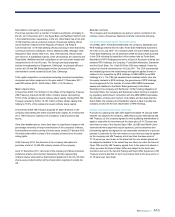 447
447 -
 448
448 -
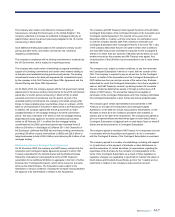 449
449 -
 450
450 -
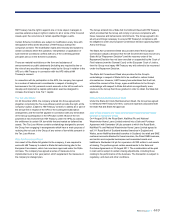 451
451 -
 452
452 -
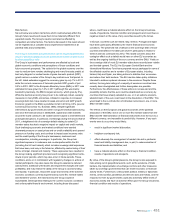 453
453 -
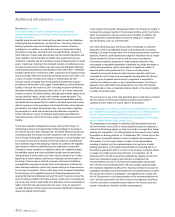 454
454 -
 455
455 -
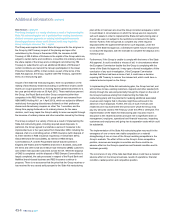 456
456 -
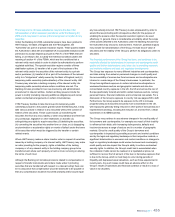 457
457 -
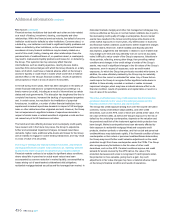 458
458 -
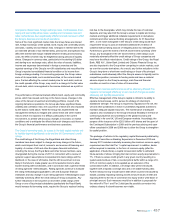 459
459 -
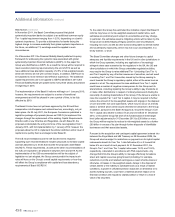 460
460 -
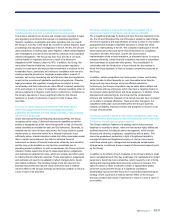 461
461 -
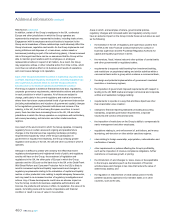 462
462 -
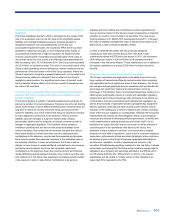 463
463 -
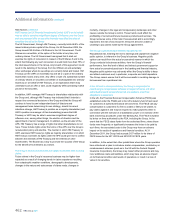 464
464 -
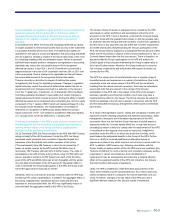 465
465 -
 466
466 -
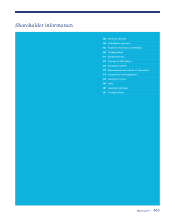 467
467 -
 468
468 -
 469
469 -
 470
470 -
 471
471 -
 472
472 -
 473
473 -
 474
474 -
 475
475 -
 476
476 -
 477
477 -
 478
478 -
 479
479 -
 480
480 -
 481
481 -
 482
482 -
 483
483 -
 484
484 -
 485
485 -
 486
486 -
 487
487 -
 488
488 -
 489
489 -
 490
490
 |
 |

RBS Group 2011 455
The Group and its UK bank subsidiaries may face the risk of full
nationalisation or other resolution procedures under the Banking Act
2009 which may result in various actions being taken in relation to any
securities
Under the Banking Act 2009, substantial powers have been granted to
HM Treasury, the Bank of England and the FSA (together, the
“Authorities”) as part of a special resolution regime. These powers enable
the Authorities to deal with and stabilise UK incorporated institutions with
permission to accept deposits pursuant to Part IV of the FSMA that are
failing, or are likely to fail, to satisfy the threshold conditions (within the
meaning of section 41 of the FSMA, which are the conditions that a
relevant entity must satisfy in order to obtain its authorisation to perform
regulated activities). The special resolution regime consists of three
stabilisation options: (i) transfer of all or part of the business of the
relevant entity and/or the securities of the relevant entity to a private
sector purchaser; (ii) transfer of all or part of the business of the relevant
entity to a “bridge bank” wholly-owned by the Bank of England; and (iii)
temporary public ownership (nationalisation) of the relevant entity. HM
Treasury may also take a holding company of the relevant entity into
temporary public ownership where certain conditions are met. The
Banking Act also provides for two new insolvency and administration
procedures for relevant entities. Certain ancillary powers include the
power to modify (including imposing additional obligations) and cancel
certain contractual arrangements in certain circumstances.
If HM Treasury decides to take the Group into temporary public
ownership pursuant to the powers granted under the Banking Act, it may
take various actions in relation to any securities without the consent of
holders of the securities. These could include: (i) transferring the
securities free from any trust, liability or other encumbrance and free from
any contractual, legislative or other restrictions on transfer; (ii)
extinguishing any rights to acquire securities; (iii) delisting the securities;
(iv) converting the securities into another form or class; or (v) disapplying
any termination or acceleration rights or events of default under the terms
of the securities which would be triggered by the transfer or certain
related events.
Where HM Treasury makes a share transfer order in respect of securities
issued by a holding company of a relevant entity, HM Treasury may make
an order providing for the property, rights or liabilities of the holding
company or of any relevant entity in the holding company group to be
transferred and where such property is held on trust, removing or altering
the terms of such trust.
Although the Banking Act includes provisions related to compensation in
respect of transfer instruments and orders made under it (including
securities that are transferred with respect to a relevant entity) there can
be no assurance that compensation would be assessed to be payable or
that any compensation would be recovered promptly and/or would equal
any loss actually incurred. HM Treasury is also empowered by order to
amend the law (including with retrospective effect) for the purpose of
enabling the powers under the special resolution regime to be used
effectively. In general, there is considerable uncertainty about the scope
of the powers afforded to the Authorities under the Banking Act and how
the Authorities may choose to exercise them. However, potential impacts
may include full nationalisation of the Group, the total loss of value of
securities and the inability of the Group to perform its obligations under its
securities.
The financial performance of the Group has been, and continues to be,
materially affected by deteriorations in borrower and counterparty credit
quality and further deteriorations could arise due to prevailing economic
and market conditions and legal and regulatory developments
The Group has exposure to many different industries and counterparties,
and risks arising from actual or perceived changes in credit quality and
the recoverability of monies due from borrowers and counterparties are
inherent in a wide range of the Group’s businesses. In particular, the
Group has significant exposure to certain individual counterparties in
weakened business sectors and geographic markets and also has
concentrated country exposure in the UK, the US and across the rest of
Europe (particularly Ireland) and within certain business sectors, namely
personal finance, financial institutions and commercial real estate. For a
discussion of the Group’s exposure to country risk see pages 208 to 228.
Furthermore, the Group expects its exposure to the UK to increase
proportionately as its business becomes more concentrated in the UK,
with exposures generally being reduced in other parts of its business as it
implements its strategy, including the reduction of, and exit from, certain
businesses in its GBM business.
The Group may continue to see adverse changes in the credit quality of
its borrowers and counterparties, for example as a result of their inability
to refinance their debts, with increasing delinquencies, defaults and
insolvencies across a range of sectors and in a number of geographic
markets. Since the credit quality of the Group’s borrowers and
counterparties is impacted by prevailing economic and market conditions
and by the legal and regulatory landscape in their respective markets, a
significant deterioration in economic and market conditions or changes to
legal or regulatory landscapes could worsen borrower and counterparty
credit quality and also impact the Group’s ability to enforce contractual
security rights. In addition, the Group’s credit risk is exacerbated when
the collateral it holds cannot be realised or is liquidated at prices not
sufficient to recover the full amount of the loan or derivative exposure that
is due to the Group, which is most likely to occur during periods of
illiquidity and depressed asset valuations, such as those experienced in
recent years. Any such losses could have an adverse effect on the
Group’s results of operations and financial condition or result in a loss of
value in its securities.
